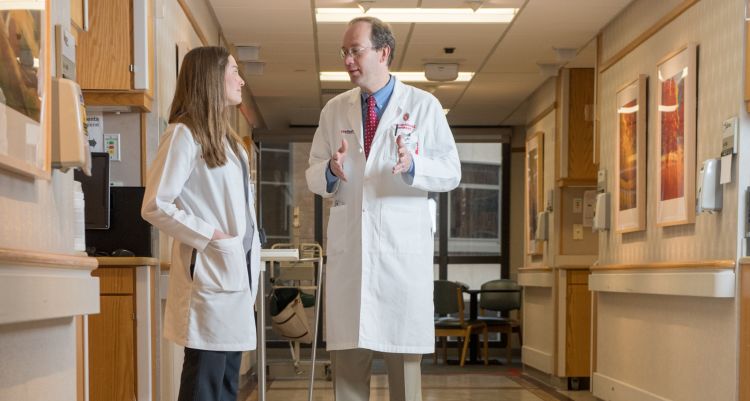Kidney transplantation: Expanding the gift of life

Established in 1966, the UW Health Kidney Transplant Program was among the first in the nation. Numbers tell its legacy: over 8,000 kidneys have been transplanted here. The program is consistently ranked among the top 10 most active programs in the US. It's ranked number 1 for performing more simultaneous kidney-pancreas transplants than anywhere else in the country.
But it's unique in other ways, too. Dr. Didier Mandelbrot (pictured above, at right) has nurtured expansion of the living kidney donor program, in which a healthy individual donates one of their kidneys. In some cases, the organ goes to a loved one. In others, it's received by someone they don't know, setting off a "paired transplant chain"-their kidney goes to a recipient, whose friend or family member donates a kidney to someone else, and so on. In 2015, a record-breaking transplant chain involving 34 donors and 34 recipients at 26 hospitals ended at UW, where it had started three months earlier.
Encouraging living donation requires time, teamwork, and endless support for donors and recipients. As an expert in the subject, Dr. Mandelbrot leads this effort and is an investigator for clinical trials involving living donation.
His expertise in combination with his compassion has been life-changing for patients such as kidney transplant recipient Jeff Bakiares, President of the Virginia Lee Cook Foundation, which has philanthropically supported Dr. Mandelbrot's research.
"The high quality of medical care that I received at the University of Wisconsin is built upon years of efforts by physicians, physician-scientists, PhDs, and other medical professionals investigating the causes of and potential treatments for disease. The tireless effort of these professionals has made many once life-threatening diseases and conditions just a memory," says Bakiares.
Our nephrologists tackle the toughest cases. UW is internationally known for performing kidney transplants on patients who would normally be ineligible because they have high levels of antibodies (which can trigger organ rejection) from a prior transplant, a blood transfusion, or pregnancy. A process called desensitization removes these antibodies from the blood. Division head Dr. Aji Djamali conducts research on antibody-mediated rejection to understand how to halt it.
There is still much to discover, though-discoveries that are poised to transform how nephrologists treat kidney diseases. "As science continues to unravel the molecular workings that underpin renal disease, we will see profound changes in the approach to treatment, and Dr. Mandelbrot is on the front lines in this fight to improve patient outcomes," says Bakiares.
Our nephrologists focus on moving medical discoveries that have been made in the laboratory setting and advancing them into medical practices that can be used by physicians to improve the lives of their patients. This is the key to a better future for people living with kidney disease.
And at UW, the future of nephrology education is bright as well. Given the volume of transplants, the complexity of cases, and the vibrancy of research, early-career nephrologists at UW are in unique training grounds. While faculty members are relentlessly dedicated to helping more patients, they're simultaneously mentoring the next generation of kidney transplant doctors to ensure that the gift of life continues.
Resources: